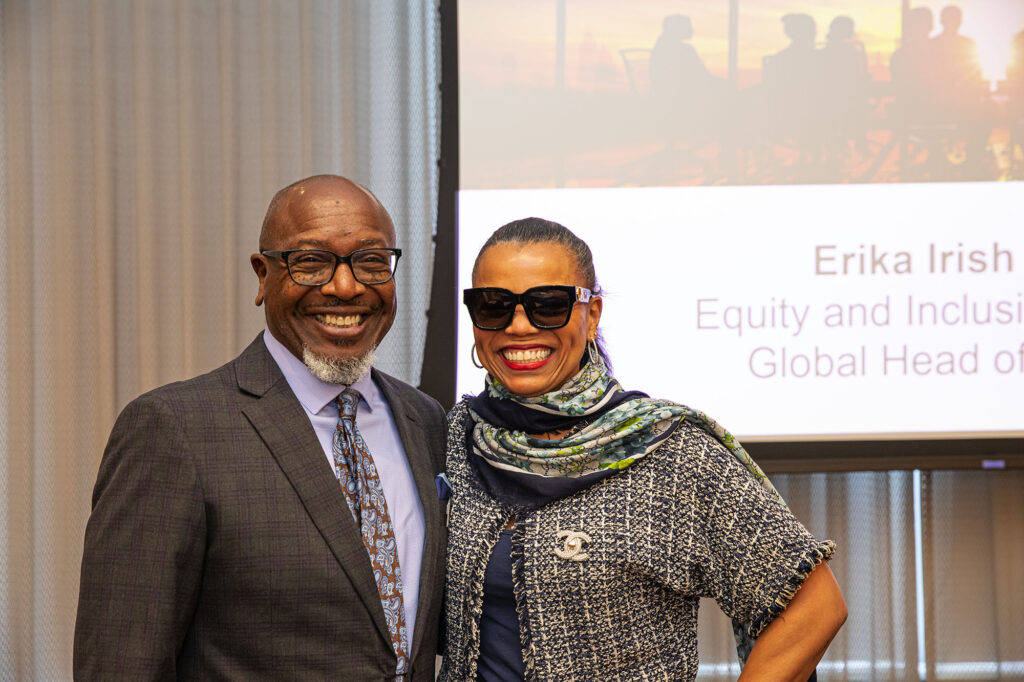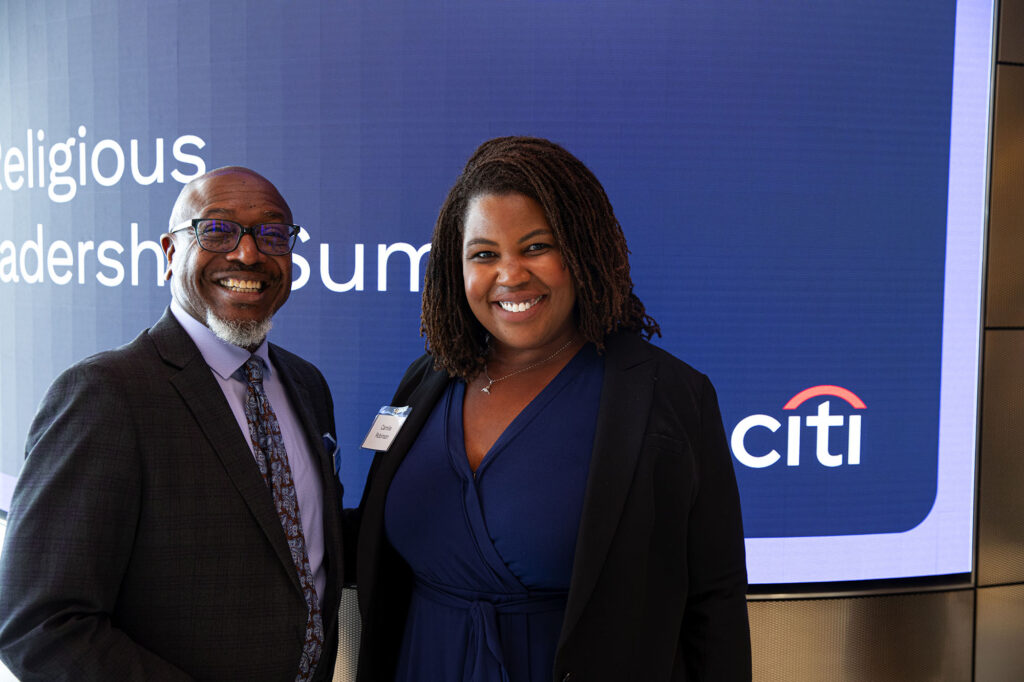
Tanenbaum CEO, Rev. Mark Fowler, and Citi Chief DEI Officer, Erika Irish Brown
Thank you for joining us at the 7th Annual Religious Diversity Leadership Summit as we unlocked the power of difference. Our return to in-person programming was filled with invaluable insights from industry experts, rich discussions, and long-awaited networking opportunities.
Tanenbaum is sad to report that, due to unforeseen technical errors, recordings of this year’s Summit are unavailable.
Please find a recap of the day’s programming, along with relevant resources and additional learnings, below.
Fireside Chat with Religious DEI Trailblazer, Farooq Kathwari, CEO of Ethan Allen
Farooq Kathwari’s success story from humble beginnings served to demonstrate the power of embracing diversity. Kathwari, the CEO of Ethan Allen, joined Tanenbaum CEO Mark Fowler for an engaging fireside chat-style conversation. He spoke of his journey from being a refugee from Kashmir to becoming a corporate leader. Farooq described his family’s separation due to conflict in the region, his eventual journey to the U.S., and his determination to succeed through it all. He recounted talking himself into a bookkeeping job and parlaying a job selling Kashmiri crafts out of his apartment into corporate success at Ethan Allen. Farooq, a co-chair of the Muslim-Jewish Advisory Council, noted how remarkable it was to be a Muslim CEO of a nationwide brand with Jewish founders.
For more information on how to embrace religious diversity in your workplace, see Tanenbaum’s Religious Diversity Checklist.
To learn more about Farooq’s inspiring story, read his autobiography, Trailblazer.

Nina Boe, Tanenbaum, with Panelists Jean-Marie Navetta, PFLAG National, Lisbeth Meléndez Rivera, BQN Consulting, and Summit Attendees
Panel on Religious Bias in the Workplace
Moderated by Tanenbaum’s founder Dr. Georgette Bennett, panelists Dr. Khyati Joshi, Dr. Jacob Labendz, and Dr. Simran Jeet Singh discussed their personal and workplace experiences of religion-based bias in areas such as attire, diet, and scheduling. Summit attendees took note of Dr. Bennett’s direct questioning when she asked the panelists: “What hurts you?” Attendees are already thinking about how to incorporate this powerful question into internal programming.
Panelists also discussed the concept of “lived religion.” Dr. Joshi defines lived religion in her book White Christian Privilege as “what religion looks like in the [everyday] lives of your [coworkers and/or employees] and their families. This may or may not resemble what you know, or the way Wikipedia describes the belief system. This approach considers the impact of culture and family traditions. For example, holidays may be celebrated in different ways by members of the same religion whose cultural traditions differ” (221).
For more insights into the ways in which religion-based bias shows up in the workplace, see Tanenbaum’s 10 Bias Danger Signs.
Panel on Religion and the Law
Moderator Holly Weiss, Tanenbaum Board Member and founder of HWH Mediation welcomed a panel of legal experts to the stage for a wide-ranging conversation about the U.S. legal landscape as it pertains to religion in the workplace.
Commissioner Keith Sonderling of the U.S. Equal Employment Opportunity Commission (EEOC) gave an overview of religious discrimination in the workplace and the recent increase in cases brought before the Commission. Commissioner Sonderling also highlighted the EEOC’s updated guidelines on religious discrimination.

PwC Team Michele Christ, Alla Aronov, Debbie Soufian, and Nadav Erlich
The panel then analyzed some of the most anticipated cases in front of the Supreme Court of the United States:
- Groff v. DeJoy centered on an evangelical Christian postal carrier who couldn’t work on Sundays as part of his observance of his Sabbath. Professor Sam Estreicher of the NYU School of Law provided an overview of the Groff v. DeJoy case and how the Court’s ruling might impact the ways in which workplaces handle future religious accommodation requests.
- Erika Simonson of Schulte Roth & Zabel LLP (SRZ) highlighted the 303 Creative LLC v. Elenis case, involving a graphic designer refusing website design services to LGBTQ+ engaged couples on the basis of her religious beliefs. They discussed the recent amicus brief SRZ filed with the Supreme Court of the United States on behalf of Tanenbaum, arguing that the state law at issue that seeks to protect equal access to public accommodations also promotes religious liberties and that a ruling for the designer would actually serve to undermine them.
Tanenbaum and SRZ previously partnered on a different amicus brief filed in support of a same-sex couple who was refused service by a bakery and its owner in connection with their request for a wedding cake (Masterpiece Cakeshop v. Colorado Civil Rights Commission).
Stay tuned for more resources on how these rulings may impact religious freedom.
Data Session with Pew Research Center
Tanenbaum welcomed researcher Janell Fetterolf who joined virtually to provide an overview of the 2021 report “Diversity and Division in Advanced Economies.” Janell highlighted specific trends, including that an increasing number of people see diversity in a positive light.

Tanenbaum CEO, Rev. Mark Fowler with Camille Robinson, FINRA
Given the Summit’s focus on religious diversity, Janell shared additional points from Pew’s 2022 Global Attitudes Survey. Highlights included a breakdown of sentiments about religion and morality in the U.S. and other advanced economies.
With a rising percentage of Americans who don’t identify with a religion, it is not surprising that most Americans surveyed did not feel it necessary to believe in God to be moral. This was true even for those who were religiously affiliated.
Additional details can be found in the reports hyperlinked below:
- 2021 Diversity and Division in Advanced Economies
- 2022 Global Attitudes Survey – overview of religion and morality
Panel on Religious-Based Employee Resource Groups
As the exploration of interfaith and faith-based employee resource groups (ERGs) remains a trending topic at Tanenbaum, the Summit convened a panel of ERG leaders to discuss better practices and real-world insights. Moderator Maria Abdullah (Senior Vice President, Citi) joined Dov Adler (Asset Management Partner, PwC) and Sofya Kulik (Managing Director, KPMG) in this engaging discussion.
The hour-long conversation underscored the business case for establishing and supporting faith-based and interfaith ERGs across industries and geography. Dov and Sofya also discussed the ways in which colleagues of all roles can drive inclusion efforts through ERGs.

Tanenbaum Founder and President, Dr. Georgette F. Bennett, and Ethan Allen CEO, Farooq Kathwari
As Sofya notably shared, “It’s easy to be inclusive, it’s easy to have this dialogue. Yes, it’s uncomfortable at times, but if we don’t ask the question, we have a 100% chance of getting it wrong.”
The recording from the 2022 Summit interfaith ERG panel recording can be found online here. Learn more about how Tanenbaum can support your organization’s interfaith or faith-based journey by contacting [email protected].
Panel on Religion and LGBTQ+ Identities
Moderated by Tanenbaum CEO, Mark Fowler, the LGBQ+ panel featured Jean-Marie Navetta, Director of Learning & Inclusion at PFLAG, and Lisbeth Melendez Rivera, Consultant at BQN Consulting.
Panelists reviewed the current landscape of LGBTQ+ inclusion, including the introduction of anti-LGBTQ+ legislation at the state level across much of the U.S. Lisbeth Melendez Rivera, meanwhile, noted the positive macro-level trend of increased support for LGBTQ+ equality globally.
Both panelists contributed to an eye-opening and personal conversation about the importance of increased engagement with both allies and individuals who are open to conversations about LGBTQ+ acceptance and inclusion. Jean-Marie explained that it can sometimes be necessary to disengage individuals who are staunchly opposed to LGBTQ+ equality in favor of working with the “moveable middle.” Lisbeth noted the importance of faith-based DEI and having important conversations at work that open people’s eyes to issues faced by the LGBTQ+ community.
For more on the intersection of religion and LGBTQ+ identities, check out our Faith and Pride YouTube series. The series shares testimonials from those within our community who identify as both LGBTQ+ and religious/spiritual.
Contact Us
For additional information or support, please contact [email protected].
Thanks to Our Generous Sponsors
We would like to thank the Summit’s generous sponsors for making these rich learnings available to the Tanenbaum community at no cost.
